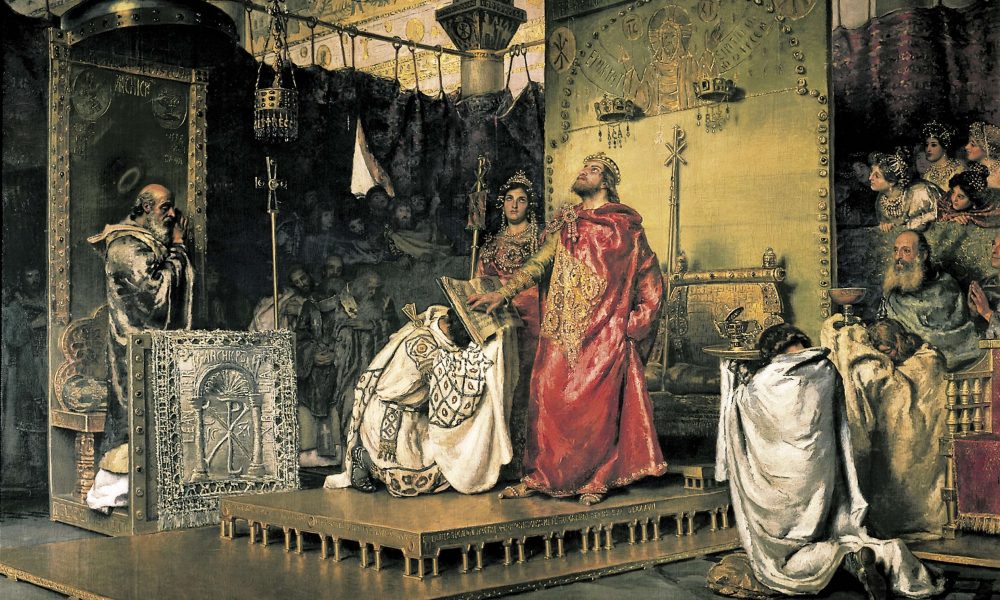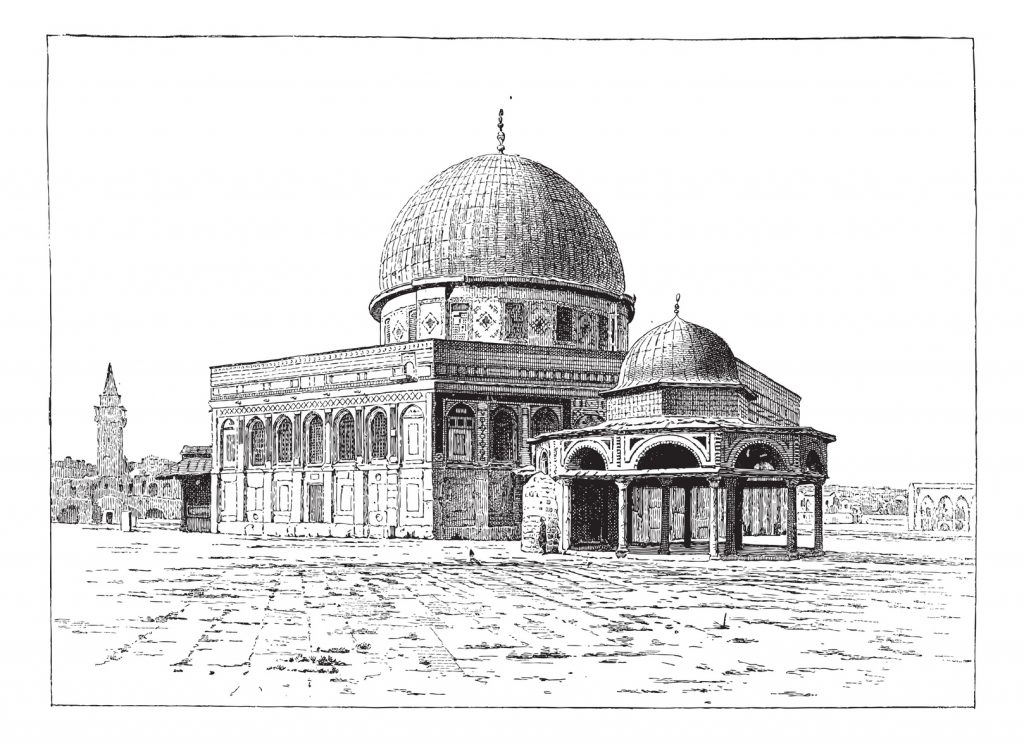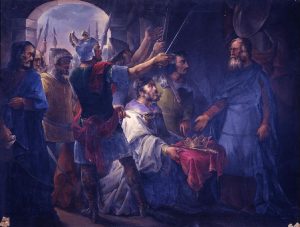
690 AD to 710 AD, Psalm 82: The Visigoths.
This site was first built in French (see www.147thgeneration.net). The English translation was mainly done using « google translation ». We have tried to correct the result of this translation to avoid interpretation errors. However, it is likely that there are unsatisfactory translations, do not hesitate to communicate them to us for correction.
(for that click on this paragraph)
Summary
This generation is from the years 690 AD to 710 AD.
According to our count, this generation is the 82nd generation associated with Psalm 82. It is in this Psalm 82 that we therefore find an illustration of the facts of this generation.
If Muhammad turned away from Jerusalem to direct his prayers to Mecca, his successors tried to reclaim Jerusalem. Especially in the generation that interests us, Abd Al ‘Malik built the Dome of the Rock in 691 on the former site of Solomon’s Temple alongside the Al Aqsa Mosque built by his predecessors.
At the same time, in 698, Carthage falls in the hands of the Arab armies, opening a little more the road towards Spain. This conquest is accompanied by the indiscriminate massacre of Christian and Jewish inhabitants and their forced conversion to Islam. So if the Arab conquest is necessary for the survival of the Jews to counterbalance the Christian power, the tribute to pay is far from negligible.
In fact, the Arab expansion must not be stopped, because the most acute danger, at least for this period, for the people of Israel remains on the Christian side, and particularly in Visigothic Spain or the anti-Jewish laws. succeed and grow. The anti-Jewish practices of the Visigoths, especially towards the new Christians, will serve as a model a few centuries later during the Christian reconquest, when many Jews will think in their turn to avoid the storm by pretending to convert. During the repression against the Marranes, many laws of the Visigothic kings will simply be reactivated.
Talk
The Dome of the Rock
On the Byzantine side, this generation is marked by the reign of Justinian II (685-695 then 705-711) interrupted by the reigns of Leonce (695-705) and Tiberius III (698-705), both executed on return to power of Justinian (who had been forced to exile in the interlude). Justinian II finished his reign by being executed in his turn by his successor Philippicos Bardanès (711-713).
On the Muslim side, this generation is that of the Caliphates of Abd Al-Malik (685-705) and Al Walid I (705-715).
When Muhammad began to declare his faith to the One God, the children of Israel could regard the new faith of Islam as a leap of nations towards divine revelation, as the advent of Christianity had been promising.
Unfortunately, fairly quickly, if Islam considers Judaism as a respectable religion, it reproaches it for being outside the truth since not recognizing Muhammad as the last of the prophets. The status of dhimmi ensues, conferring on Jews a status of second-class citizen and then competition in the possession of sacred places.

If Muhammad turned away from Jerusalem to direct his prayers to Mecca, his successors tried to reclaim Jerusalem. Especially in the generation that interests us, Abd Al ‘Malik built the Dome of the Rock in 691 on the former site of Solomon’s Temple alongside the Al Aqsa Mosque built by his predecessors.
Carthage
At the same time, in 698, Carthage falls in the hands of the Arab armies, opening a little more the road towards Spain. This conquest is accompanied by the indiscriminate massacre of Christian and Jewish inhabitants and their forced conversion to Islam. So if the Arab conquest is necessary for the survival of the Jews to counterbalance the Christian power, the tribute to pay is far from negligible.
It is in this context, where triumphant Islam feels ready to dominate the world, that a warning is given to it. At the same time that it invests Jerusalem to make it the third place of Islam, the first holy place: Mecca is made vulnerable.
Eighty years after the beginning of the Hegira and after the Muslims began to oppose their faith to those of the children of Israel, Mecca is a victim of divine wrath. Once again, God will choose water as his instrument of anger:
- In [10] the year 80 (of the Hegira), there was in Mecca a great flood, which destroyed many houses. The torrent carried all that was on its way to fully loaded camels; nothing resisted him; he even passed over the walls of the houses. This year is called the year of the torrent. In that same year, there was a violent epidemic in Baçra, from which many people died.
Through this symbolic event, God shows that if his people continue through the long night of exile, he is not thrown into pasture to the nations who remain to be held accountable for their actions. This is what the beginning of the Psalm of this generation expresses:

- A song of Asaph. God stands in the congregation of God; in the midst of the judges He will judge.
- How long will you judge unjustly and favor the wicked forever?
Visigothic Spain
In fact, the Arab expansion must not be stopped, because the most acute danger, at least for this period, for the people of Israel remains on the Christian side, and particularly in Visigothic Spain or the anti-Jewish laws. succeed and grow:
- In 680 [11], King Erwig ordered all Jews in the kingdom to accept baptism, otherwise they would have to go into exile. The nobles not deploying the same zeal as their kings in the will to oppress the Jews. They were threatened with heavy fines if they were caught helping Jews escape the laws.
The anti-Jewish practices of the Visigoths, especially towards the new Christians, will serve as a model a few centuries later during the Christian reconquest, when many Jews will think in their turn to avoid the storm by pretending to convert. During the repression against the Marranes, many laws of the Visigothic kings will simply be reactivated.
The Visigothic kings, in addition to opposing the Jews and obsessively wanting to impose Christianity on them, also like the Jewish kings, have the Church make sacred their function, thus trying to give even more legitimacy to the new covenant (Christianity) in relation to the primary covenant of the people of Israel:
- It is [12] precisely in the Visigothic kingdom that the sacral rite taken from the Old Testament knows its first reuse. It is applied to Wamba at the time of its advent, in 672. […]
- The rite of the coronation crossed the Pyrenees and the Channel less than a century after its first use.
It is this arrogance of the Visigothic kings, on the eve of their fall, that the end of the Psalm evokes:

- Judge the poor and orphan; justify the humble and the impoverished.
- Release the poor and the needy; save [them] from the hands of [the] wicked.
- This part evokes the fate of the Jews in the land of Spain, rendered as slaves, dispossessed of their property and their children.
- They did not know and they do not understand [that] they will walk in darkness; all the foundations of the earth will totter.
- While the Visigothic kings are at the height of their fight against the Jews, the Muslim troops are preparing in the African soil to make them fall.
- I said, « You are angelic creatures, and all of you are angels of the Most High. »
- Indeed, as man, you will die, and as one of the princes, you will fall.
- Arise, O God, judge the earth, for You inherit all the nations.
- The Visigothic kings wanted to impose their belief to the Jews of their kingdoms, relying on the divine nature they attribute to Jesus, the prophet of Christianity. And indirectly to the Visigothic Kings through the sacral rite. This pretension will be useless to them and will not give them the desired immunity, including from their own aristocracy. Through the future fall of the Visigothic kings, it is the triumph of the divine real that is affirmed.

[10] TABARI: « The Chronicle, The Umayads » / Chapter: « Government of Haddjadj, son of Yousef, in the Irâq » (French: « La Chronique, Les Omeyades » / Chapitre : « Gouvernement de Haddjadj, fils de Yousef, dans l’Irâq » (p.114) )
[11] CHAIM POTOK: « A story of the Jewish people ». Book III: Islam, Nightingales in the Sandstorm « . (French: « Une histoire du peuple Juif ». Livre III : L’Islam, les rossignols dans la tempête de sable » (p. 404) ).
[12] Jean-Pierre MOISSET: « History of Catholicism ». Chapter 5: « One Church, Two Cultures: East and West » (French: « Histoire du Catholicisme ». Chapitre 5 : « Une église, deux cultures : Orient et Occident » (p. 149/150) ).

